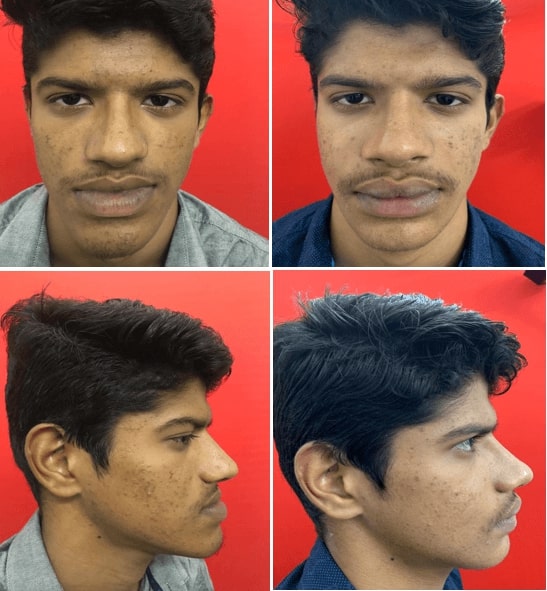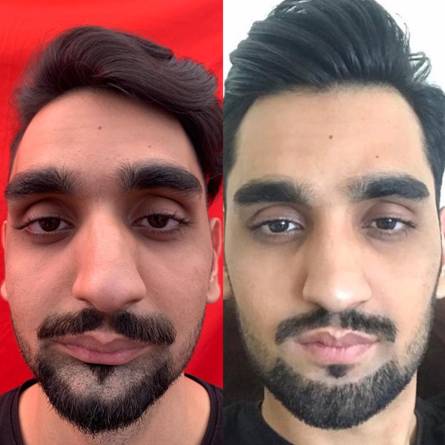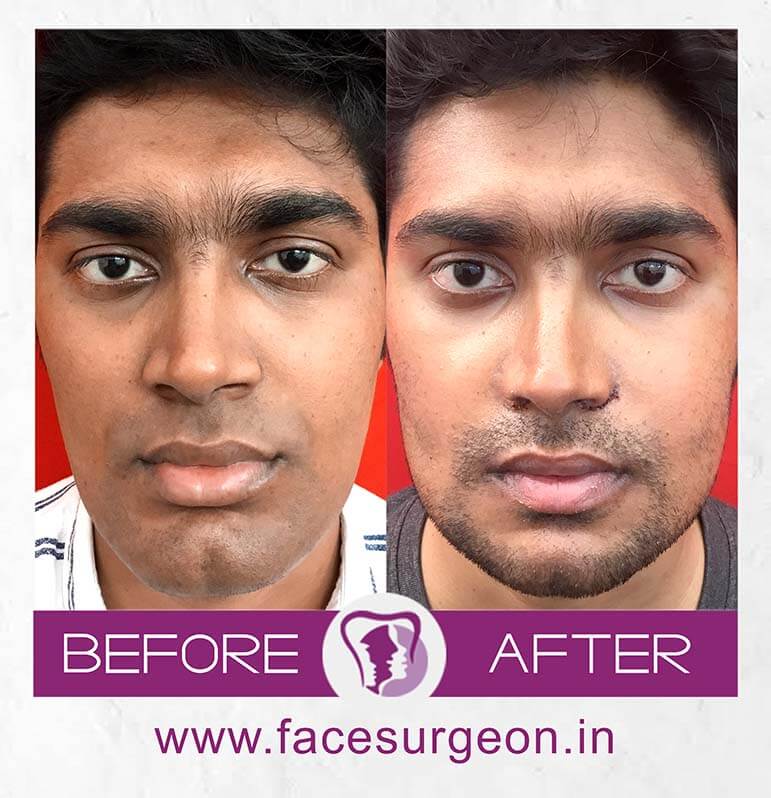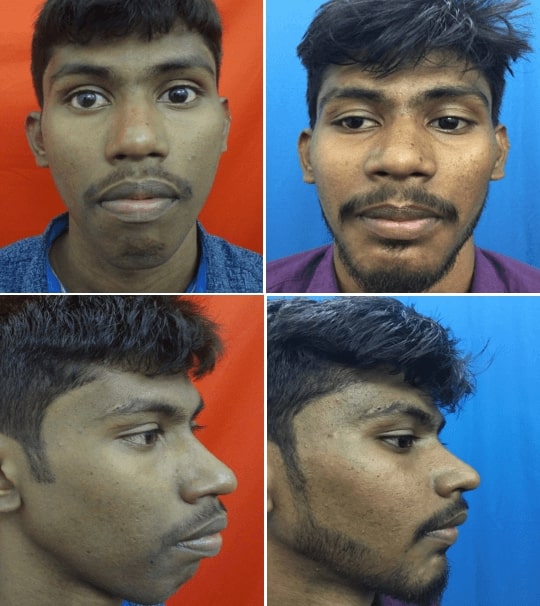All That You Wanted to Know About Jaw Plastic Surgery
There is no doubt about the fact that a strong and chiseled jawline can help you stand out from the crowd. Some celebrities in India who can boast of this coveted facial feature by jaw surgery include, Hrithik Roshan, Ileana Dcruz, and Kareena Kapoor. A strong jawline not only looks physically attractive but also conveys a sense of confidence and strength.
A perfect jaw has to do with getting the golden ratio of facial proportions right. To the uninitiated, the Golden Ratio refers to the distance between certain facial features when compared to other distances of the face is approximately at a ratio of 1.618.
What Is Orthognathic Surgery?
Commonly referred to as jaw surgery, Orthognathic surgery is a procedure to correct any irregularities in the jawbones. It is also done to realign bones around the jaws and teeth to improve its functionality and enhance aesthetic appearance. Jaw surgery is also suggested when orthodontic procedures are ineffective. Some of the other reasons for Orthognathic surgery in India include:
- Managing bite, chewing issues, and problems while swallowing
- Managing speech issues
- Correct jaw closure problems, viz. issues related to open bite
- Receding jawline or chin
- TMJ or Temporomandibular Joint Disorder
- Relief from sleep apnea
- Correct birth defects or facial injuries caused by an accident
What Are Common Orthognathic Issues?
Jaw pain is a common problem caused either by an injury or birth-related abnormality. Some of the reasons for jaw pain include TMJ, toothache, and trigeminal neuralgia. Temporomandibular Joint and Muscle Disorder affects the hinge joints and is caused either due to an injury to the jaw or other issues like arthritis.

A bad bite or malocclusion is another common jaw problem that affects most Indians. This happens when the teeth in the upper jaw do not align properly with the teeth in the lower jaw. Malocclusion, sometimes, cannot be treated with orthodontic treatment and may need surgery.
An accident or injury could cause a fracture in the jawbone, or dislocation in the lower part of the jaw, requiring surgery.
What Are the Common Orthognathic Surgeries?
Ideally, children are the best candidates for Orthognathic surgery because their jaws are not fully developed. Once the jaw is fully developed, treatment options are limited. Some of the common Orthognathic surgeries include:
1. Maxillary Osteotomy
Commonly called upper jaw surgery, this is done to correct a receded upper jaw, and help manage overbite, crossbite, and open bite. The oral surgeon makes an incision into the gums in the upper jaw to move it into the correct position. He then attaches a plastic wafer to the teeth to help it align to the upper jaw and then fixed with titanium screws and metal plates.
2. Mandibular Osteotomy
Commonly called lower jaw surgery, this procedure is done to correct a receded lower jaw and treat an underbite. The process involves moving the lower jawbone either forward or backward to bring the lower jaw to the correct position.
3. Temporomandibular Joint Disorder
As earlier discussed, TMJ disorders can be corrected through arthroplasty or key-hole surgery. The procedure involves inserting a small camera through an incision in the front of the ear to remove scar tissues, if any, to offer relief from pain. Sometimes, the oral surgeon may suggest arthrocentesis to wash out the TMJ using sterile fluid. During the procedure, the surgeon repositions the jaw and realigns the cartilage disc to help return the disc to its current location and remove debris, if any.
4. Treating Accidents and Injuries
The jaw surgeon in India may suggest surgery to help patients complaining of discomfort and are forced to follow a liquid diet. Metal plates or wires are screwed into the jaw to support the jaw while it heals.
5. Genioplasty
Commonly called chin surgery, Genioplasty involves correcting a severely receded lower jaw. During the procedure, the jaw surgeon alters the jaw while simultaneously restructuring the chin.
What Are the Side-effects of Jaw Surgery in India?
Jaw surgery, like any other surgical procedure, comes with its own set of risks. The physician must convey this to patients, allowing them to make an informed choice after weighing the pros and cons. Serious complications are rare, but again, it depends on the experience and the expertise of the physician performing the surgery. Some of the complications include:
- Excessive bleeding
- Infection at the incision site
- Reaction to anesthesia
- Damage to the teeth.
Besides these, patients may experience numbness in and around the upper lip, gums, and jaw. While this should disappear in a few hours, in extreme cases, in some patients it may last for a few weeks or even months. This depends on the type of surgery performed, because the surgeon may have to cut the nerves that need time to regrow.
Preventing Complications After the Surgery
The best way to prevent post-surgery complications is to choose a hospital that specializes in orthognathic surgery in India. Patients must also diligently follow all instructions provided by the surgical team. Since the procedure involves directing working on the bone, it needs time to heal completely. This could take around six to eight weeks. The doctor may suggest sticking to a liquid diet during this period and get enough sleep to speed up the recovery process. Make sure you complete the course of antibiotics and take painkillers without fail. It is best to avoid chewy and hard food until the physician gives you the go-ahead.
How to Choose The Right Jaw Surgeon In India?
Orthognathic jaw surgery in India is a well-developed field, offering state-of-the-art care at an affordable price. No wonder, thousands of people outside the country choose to visit India, especially the South for jaw surgeries. If you are looking for a physician offering quality jaw plastic surgery in India, here are a few things to remember.
Speak to your dentist:
Your dentist is probably the best professional to suggest a surgeon. Your friends and family can also offer suggestions, but their opinion may be based on their own experiences and not on what is best for you. Speak to friends if you would like to know how the surgeon handles patients.
Experience:
How long has the surgeon been practicing oral surgeries? How many surgeries has the physician performed till date? All this information should be easily available on the surgeon’s website. A quick Google search helps to make sure the surgeon is renowned.
Dr. Sunil Richardson is one of the best jaw surgeons in India. He has been practicing for over 2 decades and has performed over 10,000 cleft lip and palate procedures in India and across the world. Some of the procedures that he has performed include, facial plastic surgery, oral and maxillofacial surgery, and reconstructive surgery.
Expertise:
When choosing a hospital for maxillofacial surgery in India, make sure the surgeon has not only graduated from a reputed institute but is also a member of professional international organizations. Has the surgeon won awards and accolades for his/her service?
To this end, Dr. Sunil Richardson of the Richardsons Dental and Craniofacial Hospital has earned his surgical fellowship from the International Cleft Lip and Palate Foundation, Switzerland. The doctor is a member of the Royal College of Physicians and Surgeons of Glasgow and a visiting professor at Stanford and Yale. Dr. Richardson is a consultant physician at Apollo Hospitals across India and was awarded for his selfless service by several organizations, including Rotary and Smile Train. No wonder, he is one of the best orthognathic surgeons in India.
Jaw Surgery Cost in India
Unlike in the West, jaw surgery is comparatively inexpensive. You can avail of access to the best facilities at affordable prices. Visit us at https://facesurgeon.in/ for further details.



